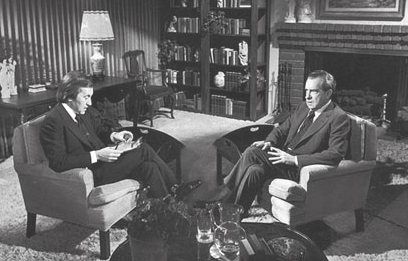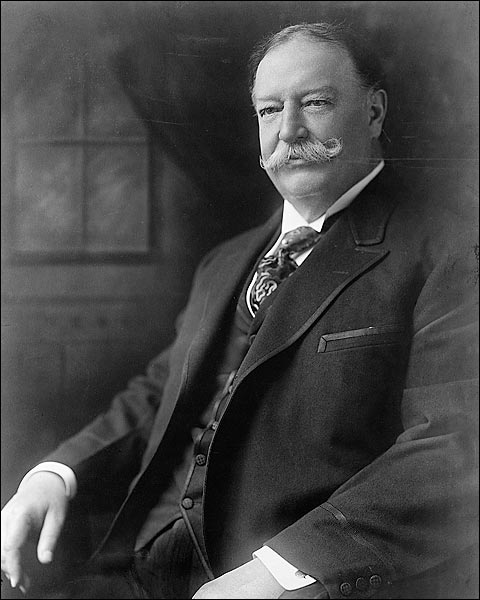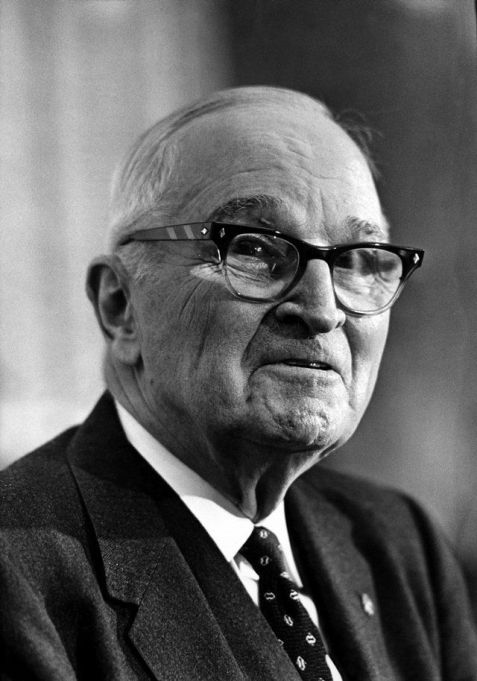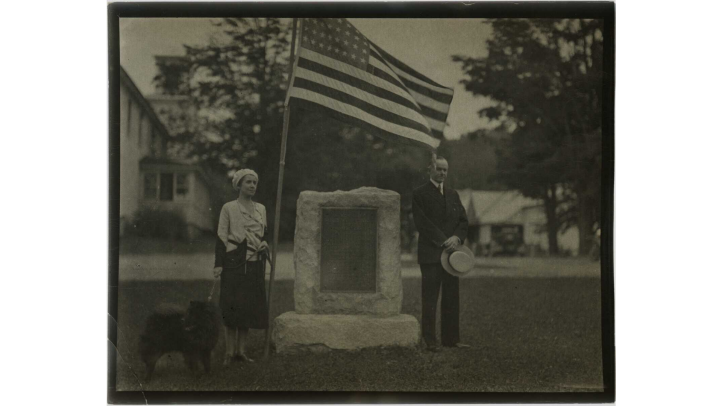
A session from the interviews between David Frost and Richard Nixon at Yorba Linda, California, 1977. Photo courtesy of http://www.pophistorydig.com.
Cal Thomas, over at Townhall, reflects on how our newest arrival to the “Ex-President’s Club” is already perpetuating the disturbing trend of Richard Nixon (as Joe McGuinness put it in his 1968 book) of “selling the presidency.” Nixon’s $1 million interview with David Frost in 1977 simply built upon what his old boss had initiated in 1958. That was when “Ike” Eisenhower signed the Former Presidents Act, granting the nucleus of benefits that would begin to accumulate around Presidents in retirement. Even so, Nixon never took speaker’s fees beyond that recorded interview. Once he sold the interview to Frost, he did not charge audiences the privilege of hearing him talk in person. He spoke for free.
While “Ike” found the Secret Service detail at his Gettysburg farm unnecessary, and spoke publicly on occasion, the real precedent was set in 1977 by Gerald Ford who took up the plush speaker’s circuit that would continue with Reagan (who gave two speeches in Japan for $2 million) and would become almost a trademark industry under the Bushes and Clintons.
What to do with our former Presidents is not a new question. It has been a concern long before this trend started. However, this precedent – like a growing parasite – demands greater and greater resources simply to sustain more and more privileges from its host. The $200,000 plus pensions, lucrative speaker’s fees, transition staff, stipends, lifetime Secret Service protection for entire families, the increasing extravagance of presidential libraries all point to something far beyond the dignity accorded a statesman. Rather, this exploitation of the Presidential office illustrates a measure of contempt for it and, even more, for the people who will be paying these expenditures long after every one of us is gone. Already yoked to a $20 trillion debt, this helps destroy the Office and the selfless service it was originally intended to embody.

William Howard Taft
Former President Taft once joked to the literary Lotos Club in New York that there would be less a burden to the country if the post-White House life involved chloroform and the lotos fruit (a reference to Tennyson’s “The Lotos-Eaters,” applied by Taft to mean Presidents should surrender to perpetual sleep, drifting into dreams from which they “return no more”).

Former President Harry Truman
Eisenhower’s predecessor, Harry Truman, was clear: “I could never lend myself to any transaction, however respectable, that would commercialize on the prestige and dignity of the office of the presidency.”
Ironically, he would agree with Calvin Coolidge, who quietly retired to his $32-dollar a month duplex on Massasoit Street in Northampton in 1929. In fact, the Coolidges would be compelled to move simply to get away from the unremitting attentions they now had pressing upon them from the public. When the media reported that their new $40,000 home, The Beeches, had 16 rooms, Grace (knowing there were only 12) wryly retorted, “There are four rooms we can’t find.” When filling out a membership card to the Washington Press Club in 1932, for “Occupation” Cal put “Retired.” Then, in characteristic fashion, under “Comments,” elaborated, “And glad of it.” He refused to take money for public speaking and delivered the few speeches he did give at his own expense. Agreeing reluctantly to work with private news syndicates, he conscientiously composed a daily column for a time, and wrote articles, carefully tallying the word counts and readily returning funds if articles did not “make the cut.” The Coolidges simply would not exploit the Office for their own benefit.

The Coolidges at the July 4th festivities in Plymouth Notch, Vermont in 1931. Photo courtesy of the Alton H. Blackington Collection (PH 061). Special Collections and University Archives, University of Massachusetts Amherst Libraries.
Coolidge was observing the standard befitting all former Presidents, when he wrote, “It is a wholesome thing for them to return to the people…” With relief, he would continue, “Fortunately, they are not supported at public expense after leaving office, so they are not expected to set an example encouraging to a leisure class.” Instead, he would say, “It is becoming for them to engage in some dignified employment where they can be of service as others are.” The Coolidges, with no pension, no Secret Service, no transition staff, no circuit fees, lived as they always had: modestly and simply. It is likely that Cal often remembered his father’s admonition, reiterated since his boyhood, on the humiliation of chickens, trying to roost higher than one’s station, who are eventually corrected by the pecking order.
Perhaps Americans should reassess whether they are supporting a burgeoning series of royal families at unlimited cost or whether we intend to keep a Republic any longer.